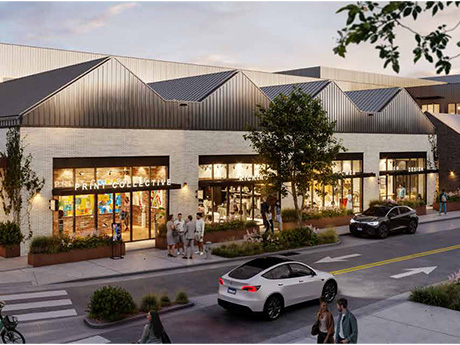Nashville’s office market is navigating a transformative period as the city evolves into a national powerhouse for commerce, culture and corporate investment. Fueled by continued population growth, economic diversification and a wave of new developments, Nashville remains an attractive and resilient market despite headwinds in the broader commercial real estate landscape.
Economic trends
Nashville’s economic landscape continues to shift in ways that support long-term office market vitality.

Population growth: One of the fastest-growing cities in the United States, Nashville continues to benefit from a steady influx of new residents. The expanding talent pool is a major driver of office demand as companies look to establish or expand their footprint in a market rich in skilled labor and cultural vibrancy.
Diversifying economy: While music and healthcare have long been economic cornerstones, the city is now seeing strong momentum in sectors like technology, finance, professional services and logistics. These industries bring high-paying jobs and are increasingly seeking high-quality office space that reflects their evolving workplace needs.
Return-to-office strategies: Like many U.S. markets, Nashville has witnessed the rise of hybrid work models. However, rather than diminishing the importance of the office, this shift is redefining its role. Employers are focused on right-sizing their footprints while investing in spaces that foster collaboration, culture and innovation. This trend has led to increased demand for modern, flexible and well-located office environments.

New developments
New developments across the city are redefining Nashville’s office landscape and positioning it as a hub for innovation and business. These include:
• Neuhoff District (Germantown): This 914,000-square-foot mixed-use project is transforming a former meatpacking plant into a modern urban destination. With a 14-story office tower, creative adaptive reuse space and a vibrant mix of retail and residential offerings, Neuhoff is drawing interest from tenants seeking a blend of character and modern functionality.
• Fifth + Broadway (Downtown): Located at the heart of the city, this prominent development features Class A office space alongside retail, dining, entertainment and residential units. It has quickly become a magnet for businesses seeking a high-energy environment with unparalleled access to amenities.

• 5 City Blvd (Midtown): Situated within the OneCity innovation corridor, this 330,000-square-foot office tower rises 15 stories and caters to companies prioritizing sustainability and technology integration, all within close proximity to the CBD, Midtown and both executive and workforce housing.
• Nashville Yards (Downtown): One of the city’s most ambitious projects, Nashville Yards spans more than 3 million square feet of Class A office space, along with hotels, residential units, retail, and entertainment venues. Major corporate tenants, including tech and media firms, have already staked claims in the development, solidifying its status as a transformative project.
• Ashwood 12 South: In the trendy 12 South neighborhood, this new mixed-use development offers 73,000 square feet of boutique office space, 27,800 square feet of retail and nearly 17,000 square feet of restaurant space. Its location and scale appeal to creative firms and growth-stage companies seeking a unique office experience.

Submarkets to watch
As Nashville expands, certain submarkets are emerging as key destinations for office development and leasing activity. These include:
Germantown: With projects like Neuhoff District leading the way, Germantown is blending historic charm with cutting-edge design. The neighborhood’s walkability, proximity to downtown and unique architecture make it a prime spot for adaptive reuse and creative office developments.
CBD/Midtown/Gulch: These core submarkets continue to attract interest from corporate tenants due to their proximity to major institutions like Vanderbilt University and Nashville’s premier medical facilities. The Gulch, in particular, has become a favorite among tech companies and startups, drawn to its urban vibe and lifestyle amenities.
Leasing trends
Leasing activity in Nashville is increasingly focused on Class A and newly delivered office space. Tenants are prioritizing buildings that offer modern amenities, sustainability features and layouts that support flexible work. As a result, asking rents for premium office space are trending upward, especially in high-demand submarkets. Landlords of older assets are responding by investing in renovations or repositioning strategies to stay competitive.
Despite national trends of office downsizing, Nashville’s leasing pipeline remains healthy, with several notable deals completed and more in the works across a range of industries. The market’s relative affordability compared to coastal gateway cities is a key draw for companies seeking value without sacrificing quality or talent.
Outlook for 2025
Looking ahead, Nashville is well-positioned for continued momentum in its office market. The city’s combination of population growth, business-friendly governance and ongoing investment in infrastructure and real estate keeps it on the radar for both occupiers and investors. While the office sector will continue to evolve in response to workplace shifts, Nashville’s fundamentals remain strong.
As demand adjusts and development activity continues, we expect leasing velocity to pick up, particularly in best-in-class properties. Nashville’s appeal — grounded in livability, opportunity and culture — will ensure it remains a top destination for companies shaping the future of work.
— By Rob Lowe (Executive Managing Director and Partner), Robby Davis (Managing Director), Stewart Lyman (Managing Director) and Maddison Sickels (Vice President) of Stream Realty Partners. This article was originally published in the April 2025 issue of Southeast Real Estate Business.


